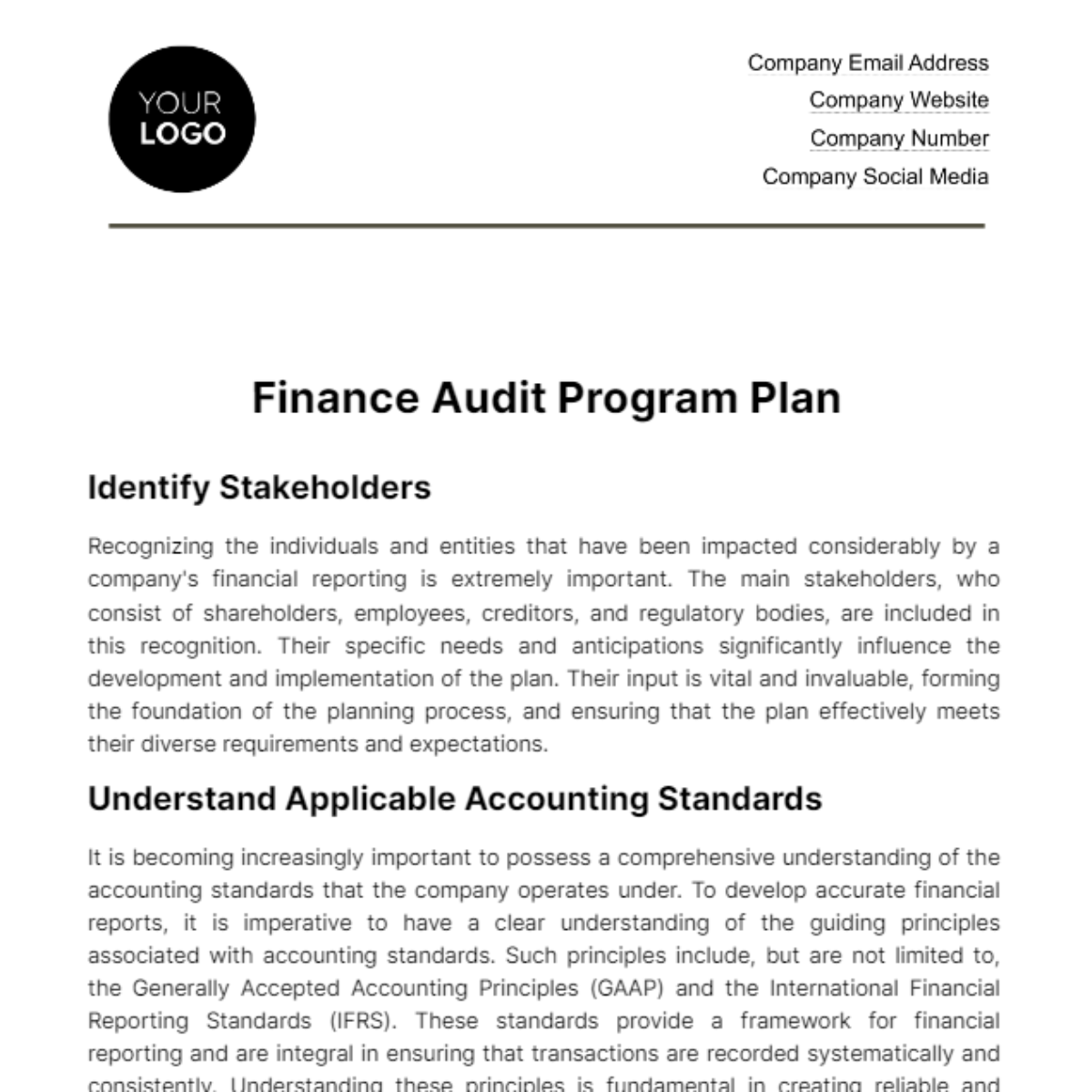Free Finance Audit Program Plan

Identify Stakeholders
Recognizing the individuals and entities that have been impacted considerably by a company's financial reporting is extremely important. The main stakeholders, who consist of shareholders, employees, creditors, and regulatory bodies, are included in this recognition. Their specific needs and anticipations significantly influence the development and implementation of the plan. Their input is vital and invaluable, forming the foundation of the planning process, and ensuring that the plan effectively meets their diverse requirements and expectations.
Understand Applicable Accounting Standards
It is becoming increasingly important to possess a comprehensive understanding of the accounting standards that the company operates under. To develop accurate financial reports, it is imperative to have a clear understanding of the guiding principles associated with accounting standards. Such principles include, but are not limited to, the Generally Accepted Accounting Principles (GAAP) and the International Financial Reporting Standards (IFRS). These standards provide a framework for financial reporting and are integral in ensuring that transactions are recorded systematically and consistently. Understanding these principles is fundamental in creating reliable and meaningful financial reports, thus the need for a thorough comprehension is an undeniable requirement.
Get to know the Regulatory Frameworks
It is of paramount importance that you take the necessary time to acquaint yourself with all legal and regulatory obligations about financial reporting, to guarantee that you consistently uphold these standards in your work. The scope of relevant regulations that must be noted can potentially cover a myriad of dimensions. These can encompass laws and standards determined at various geographical levels such as regional, national, or even international stages. Moreover, they can also include financial regulations set forth by different authoritative financial bodies. Not to mention, there are likely to be explicit guidelines in place for different sectors within the industry that must be honored. Therefore, to uphold ethical standards in the field, and to protect oneself from potential legal consequences, it is crucial to be thorough in understanding all legal requirements and industry-specific expectations.
Developing And Implementing Robust Internal Control Systems
To ensure the accuracy of financial reports, it is of utmost importance to implement robust internal control systems. These systems comprise various procedures such as approvals, authorizations, verifications, reconciliations, and operational performance reviews. All these measures put together help in not only identifying but also preventing errors and potential fraud instances. Therefore, a strong emphasis must be put on the creation and maintenance of solid internal control systems for the overall financial health and transparency of the organization.
Regular Auditing
The audit processes hold a critical place when it comes to confirming the correctness of the accounting practices. By performing both internal audits inside the firm and external audits from an independently hired entity frequently, a firm can successfully spot any shifts from the defined accounting standards which should ideally be adhered to. Not only this, but regular audits can also verify the genuineness and impartial representation of financial statements thereby further ensuring their accuracy.
Consistent Application of Accounting Policies
It is crucial to maintain consistency in the application of accounting policies if one wishes to ensure a true and fair representation of a company's financial position, its performance, and its cash flows. This is because if there are any inconsistencies in the application of these accounting policies, it may lead to the representation of inaccurate information regarding the company's financial state. This could potentially mislead stakeholders who rely on this information to make informed decisions.
Educating Employees About Compliance
It is of critical importance that every employee who has a role within the financial reporting process has a thorough understanding of how imperative it is to adhere to the standards set for accounting, as well as the requirements that have been established by law. To ensure that all staff members are knowledgeable about and actively implementing these standards and requirements, it is beneficial to provide regular training sessions. These sessions can serve as a platform where any uncertainties or misunderstandings related to accounting standards and legal requirements can be thoroughly addressed.
Technological Integration
The enhancement and increased use of technology to automate the process of financial reporting has been proven to reduce the likelihood of errors made by humans. In addition to this, it also serves to strengthen internal controls and subsequently increase efficiency. Despite these positive aspects, it is crucial to approach this advancement with a sense of caution to avoid exposing oneself to potential cybersecurity risks.
Transparency and Accountability
It is of utmost importance to foster and promote an organizational culture that places high value on transparency and accountability. This is a critical aspect because it motivates and encourages every single member of the team to own up to their responsibilities. Each person's role is vital in ensuring the accuracy of all financial statements that the organization produces and making sure that all activities conducted by the organization comply with the set regulations and standards. This way, all teams fully understand and act upon their tasks and duties, resulting in a more efficient and effective organization.
Constant Monitoring and Review
In conclusion, it is of pivotal significance to constantly monitor and perform a regular review of the financial reporting process. The importance of this step cannot be overstated as it facilitates the early detection and timely rectification of any divergences or mistakes that may occur. This ongoing vigilance not only guarantees sustained compliance with the relevant standards and regulations but also aids in the conservation of the financial system's integrity and credibility. Besides, with legal requirements continuously transforming, it becomes utterly essential to routinely scrutinize these changes. This ensures that the organization remains up-to-date and continues to abide by the latest compliance requirements laid out by law.
- 100% Customizable, free editor
- Access 1 Million+ Templates, photo’s & graphics
- Download or share as a template
- Click and replace photos, graphics, text, backgrounds
- Resize, crop, AI write & more
- Access advanced editor
Discover financial precision with the Finance Audit Program Plan Template from Template.net. This editable and customizable template streamlines your audit process, ensuring accuracy and compliance. Harness the power of the AI Editor Tool to personalize your plan effortlessly. Elevate your financial scrutiny with a template designed for efficiency and tailored to your organization's unique needs.





























